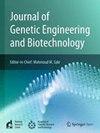Biodegradation of plastics and pesticides by soil bacteria in Bangladesh: Insights into antibiotic resistance and potential therapeutic targets
IF 2.8
Q3 Biochemistry, Genetics and Molecular Biology
Journal of Genetic Engineering and Biotechnology
Pub Date : 2025-07-15
DOI:10.1016/j.jgeb.2025.100532
引用次数: 0
Abstract
Soil bacteria exhibit varying degrees of tolerance to different concentrations of pesticides and plastics, and some possess the ability to degrade them, which is crucial for bioremediation. However, the multidrug-resistant properties of these bacteria pose challenges for their potential applications. Hence, this study aims to separate and characterize plastics and pesticide-degrading bacteria from non-contaminated and contaminated sites in Bangladesh and evaluate their antibiotic-resistant patterns to identify safety issues and discover promising therapeutic targets for combating multidrug-resistant infections. In the current study, a total of 90 soil samples were collected from different agricultural and dumped sites of Bangladesh, and bacterial isolates were screened for pesticides and plastics-degrading capabilities. Antibiotic sensitivity patterns of the potential isolates were evaluated using 16 different antibiotics. Biochemical, molecular, and genomic analyses were conducted to characterize the bacteria and identify antimicrobial resistance (AMR) genes. Our study screened out 122 plastic and 60 pesticide-tolerant bacterial isolates. Among them, 3 pesticide and 3 plastic-degrading isolates were found to be more promising and identified as Acinetobacter baumannii with pesticide-degrading capabilities from non-contaminated sites, and Klebsiella pneumoniae with plastic-degrading capabilities from contaminated sites. Antibiotic sensitivity test exhibited that most of the isolates were resistance to commonly used antimicrobials. The genomics and proteomics analysis uncovered the efflux pump-related genes responsible for the resistant mechanism and highlighted the involvement of genes that respond to antibiotics and transmembrane transport activities. Phylogenetic analysis confirmed the conservation of 2 common resistance genes adeF and gyrA, across diverse multidrug-resistant pathogens. Therefore, targeting conserved genes adeF and gyrA, to disrupt resistance mechanisms and combat persistent and clinically significant multidrug-resistant pathogens could be a promising strategy for developing combination therapies in medical science.
孟加拉国土壤细菌对塑料和农药的生物降解:对抗生素耐药性和潜在治疗靶点的见解
土壤细菌对不同浓度的农药和塑料表现出不同程度的耐受性,有些细菌具有降解它们的能力,这对生物修复至关重要。然而,这些细菌的多重耐药特性给它们的潜在应用带来了挑战。因此,本研究旨在从孟加拉国未受污染和受污染的地点分离和表征塑料和农药降解细菌,并评估其抗生素耐药模式,以确定安全问题,并发现对抗多重耐药感染的有希望的治疗靶点。在目前的研究中,从孟加拉国不同的农业和倾倒地点共收集了90个土壤样本,并筛选了细菌分离物的农药和塑料降解能力。使用16种不同的抗生素评估潜在分离株的抗生素敏感性。进行了生化、分子和基因组分析,以表征细菌并鉴定抗微生物药物耐药性(AMR)基因。我们的研究筛选出122株塑料耐药菌和60株农药耐药菌。其中,3株农药降解菌和3株塑料降解菌被认为具有较好的应用前景,分别鉴定为具有非污染场所农药降解能力的鲍曼不动杆菌和具有污染场所塑料降解能力的肺炎克雷伯菌。抗生素敏感性试验表明,大多数分离株对常用抗菌素具有耐药性。基因组学和蛋白质组学分析揭示了与耐药机制有关的外排泵相关基因,并强调了对抗生素和跨膜运输活动作出反应的基因的参与。系统发育分析证实,在多种多重耐药病原体中存在2种常见耐药基因adeF和gyrA。因此,以保守基因adeF和gyrA为靶点,破坏耐药机制,对抗持续的、具有临床意义的多药耐药病原体,可能是开发医学联合疗法的一种有前景的策略。
本文章由计算机程序翻译,如有差异,请以英文原文为准。
求助全文
约1分钟内获得全文
求助全文
来源期刊

Journal of Genetic Engineering and Biotechnology
Biochemistry, Genetics and Molecular Biology-Biotechnology
CiteScore
5.70
自引率
5.70%
发文量
159
审稿时长
16 weeks
期刊介绍:
Journal of genetic engineering and biotechnology is devoted to rapid publication of full-length research papers that leads to significant contribution in advancing knowledge in genetic engineering and biotechnology and provide novel perspectives in this research area. JGEB includes all major themes related to genetic engineering and recombinant DNA. The area of interest of JGEB includes but not restricted to: •Plant genetics •Animal genetics •Bacterial enzymes •Agricultural Biotechnology, •Biochemistry, •Biophysics, •Bioinformatics, •Environmental Biotechnology, •Industrial Biotechnology, •Microbial biotechnology, •Medical Biotechnology, •Bioenergy, Biosafety, •Biosecurity, •Bioethics, •GMOS, •Genomic, •Proteomic JGEB accepts
 求助内容:
求助内容: 应助结果提醒方式:
应助结果提醒方式:


